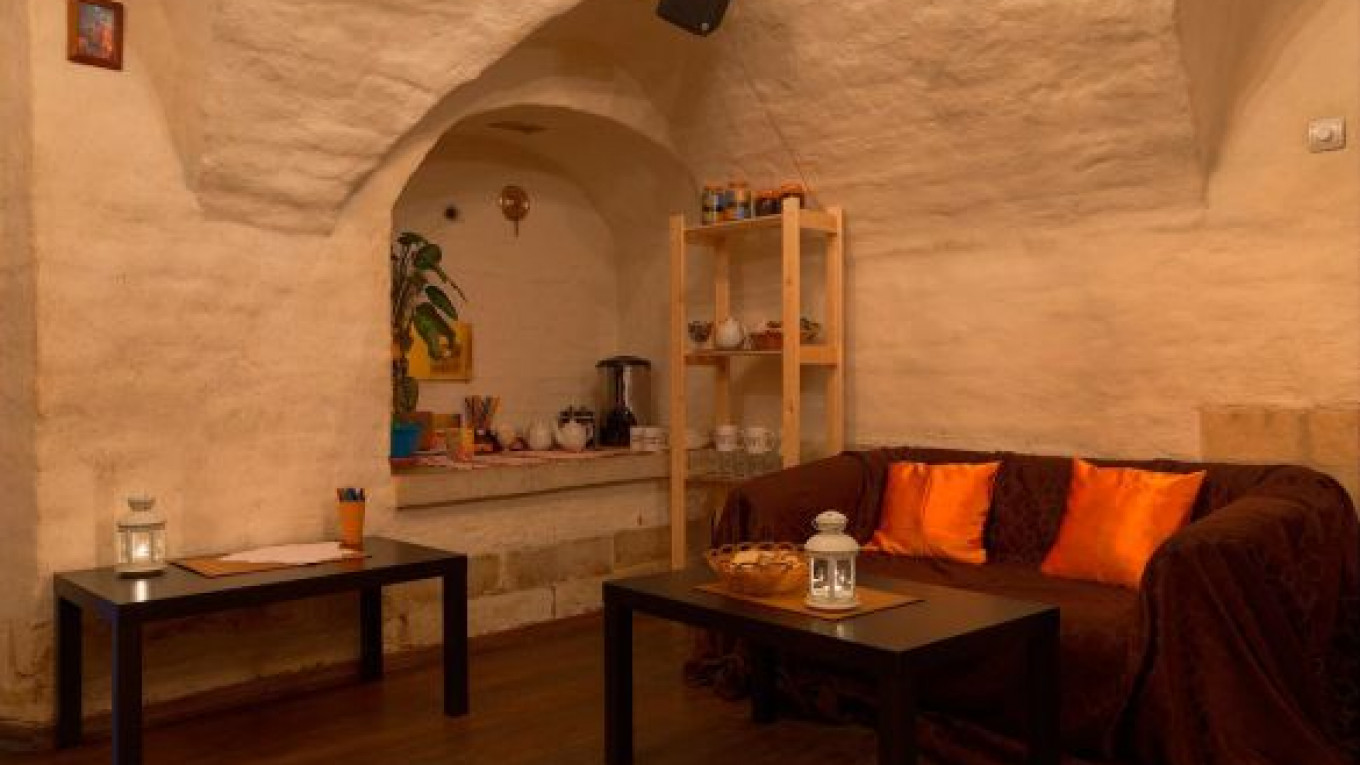As the attention of the city’s visitors is drawn to a wide array of new attractions and amusements, restaurateurs and entrepreneurs are consistently challenged to find new social spaces to draw in fickle — yet valuable — groups of trendy customers.
The founders of the first Moscow anti-cafes were committed to launching not only a new kind of business, but a new trend for specializing in how spare time was spent in them.
These days, the growing number of “anti-cafes” that function in Moscow, follow the rule that no matter what quantity of food or drink is ordered by a customer, the amount that they pay is based on the total time spent in the business. Clients can be charged per minute, per hour or per half hour. The average rate is two rubles per minute.
Since the concept of the “anti-cafe” started gaining momentum in Moscow, competition has been stiff. Each must offer a new idea.
In big cities, people are frequently torn between several jobs and obligations and tend to put a premium on their personal time. Therefore, the mentalities of these cafe owners was that customers should be billed only for the time elapsed since their entrance to the building.
“Bringing food is allowed. If a person wants to have some cake with friends, he brings it with him, or if he’s snacking on a fast-food meal he can bring it with him and even heat it up in the microwave,” said Denis Anufriyev, a spokesman for the Kaktus anti-cafe in Moscow.
Furthermore, in some anti-cafes the billing itself is limited, meaning that after about five hours spent in the cafe, one can keep on sitting there free of charge for as long as one wants, or at least until closing time.
As guests arrive in most of these spaces, they just get cozy on the sofa with a book, work, play or watch TV. However, the founders of the “anti-cafe movement” went further. They also started thinking of filling the well of personal creativity within their place.
As the movement has developed over the past year, the anti-cafes that were traditionally set up like ordinary cafes have developed into hubs with enough space to host a wide range of arts and crafts classes, studios, lectures, workshops and business meetings. Some anti-cafes have a reputation for being the best place to get together and play board games.
“It seems to me that the anti-cafe is a new form of leisure for modern-day youth. The older generation still remembers Pioneers’ Palaces [originated in the Soviet Union]. Anti-cafés are very similar to them,” Viktor Zotkin said, the founder of the Wooden Door club on Taganskaya Ulitsa. If at one anti-cafe the target audience is the 16- to 22-year-old age group — as at the Zelyonaya Dver cafe on Milutinsky Pereulok — in another one, the average age of attendees may be a bit higher — 22 to 27 years old on average as with the Wooden Door.
With stiff competition already brewing between anti-cafes, their creative owners try to outdo their rivals with the diversity of activities and events.
“We paid more attention to our activities right from the very beginning. … So one of these days when we didn’t have an interesting lecture or a speaking club session, we launched something on our own,” Zotkin said. Over time, anti-cafes have started hosting business conferences, alumni programs and even film festivals. There are tens of companies collaborating with anti-cafes in arranging joint events. Most of them are intended for office workers, said Anastasia Tzapko, art-director of the Art-sreda company. They are the most regular visitors of classes offered in fields such as landscape, urban design and architecture.
As even more cafes advertise their upcoming openings, the trend in anti-cafes seems to be heading toward greater and greater specialization. Some of the new cafes are advertising themselves as speaking clubs or startup incubators.
“Our anti-cafe was considered to be a multilingual center. Early on, I was happily surprised when I saw foreigners coming by to our place,” said Zotkin from the Wooden Door.
FreeBar People, founded by Alexander Avoyev, announced itself to be an incubator for startup businesses. Now, apart from its cafe activities, it hosts several workshop corners.
“We support people resting in a healthy way with healthy vibes, we fight smoking and alcoholism among teens and we offer them creative activities. It is a pity that the government has not yet supported the project, which has many social benefits,” Anufriyev affirmed.
It seems that despite this, more and more young people are pleased to follow the lead of the “anti-cafe movement” participants.
Contact the author at [email protected]
A Message from The Moscow Times:
Dear readers,
We are facing unprecedented challenges. Russia's Prosecutor General's Office has designated The Moscow Times as an "undesirable" organization, criminalizing our work and putting our staff at risk of prosecution. This follows our earlier unjust labeling as a "foreign agent."
These actions are direct attempts to silence independent journalism in Russia. The authorities claim our work "discredits the decisions of the Russian leadership." We see things differently: we strive to provide accurate, unbiased reporting on Russia.
We, the journalists of The Moscow Times, refuse to be silenced. But to continue our work, we need your help.
Your support, no matter how small, makes a world of difference. If you can, please support us monthly starting from just $2. It's quick to set up, and every contribution makes a significant impact.
By supporting The Moscow Times, you're defending open, independent journalism in the face of repression. Thank you for standing with us.
Remind me later.






